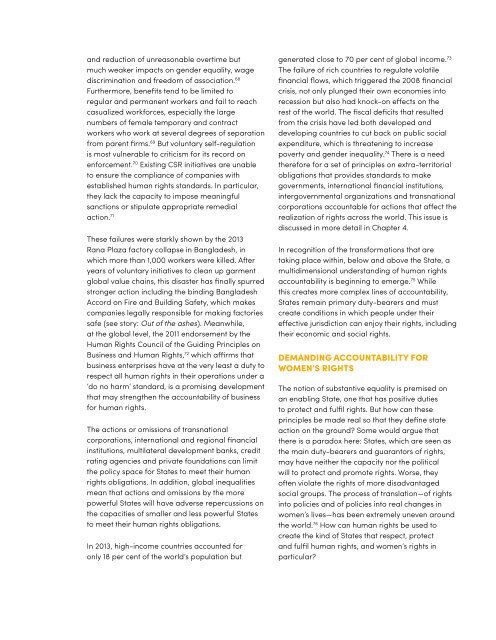1GzuFGC
1GzuFGC
1GzuFGC
You also want an ePaper? Increase the reach of your titles
YUMPU automatically turns print PDFs into web optimized ePapers that Google loves.
and reduction of unreasonable overtime butmuch weaker impacts on gender equality, wagediscrimination and freedom of association. 68Furthermore, benefits tend to be limited toregular and permanent workers and fail to reachcasualized workforces, especially the largenumbers of female temporary and contractworkers who work at several degrees of separationfrom parent firms. 69 But voluntary self-regulationis most vulnerable to criticism for its record onenforcement. 70 Existing CSR initiatives are unableto ensure the compliance of companies withestablished human rights standards. In particular,they lack the capacity to impose meaningfulsanctions or stipulate appropriate remedialaction. 71These failures were starkly shown by the 2013Rana Plaza factory collapse in Bangladesh, inwhich more than 1,000 workers were killed. Afteryears of voluntary initiatives to clean up garmentglobal value chains, this disaster has finally spurredstronger action including the binding BangladeshAccord on Fire and Building Safety, which makescompanies legally responsible for making factoriessafe (see story: Out of the ashes). Meanwhile,at the global level, the 2011 endorsement by theHuman Rights Council of the Guiding Principles onBusiness and Human Rights, 72 which affirms thatbusiness enterprises have at the very least a duty torespect all human rights in their operations under a‘do no harm’ standard, is a promising developmentthat may strengthen the accountability of businessfor human rights.The actions or omissions of transnationalcorporations, international and regional financialinstitutions, multilateral development banks, creditrating agencies and private foundations can limitthe policy space for States to meet their humanrights obligations. In addition, global inequalitiesmean that actions and omissions by the morepowerful States will have adverse repercussions onthe capacities of smaller and less powerful Statesto meet their human rights obligations.In 2013, high-income countries accounted foronly 18 per cent of the world’s population butgenerated close to 70 per cent of global income. 73The failure of rich countries to regulate volatilefinancial flows, which triggered the 2008 financialcrisis, not only plunged their own economies intorecession but also had knock-on effects on therest of the world. The fiscal deficits that resultedfrom the crisis have led both developed anddeveloping countries to cut back on public socialexpenditure, which is threatening to increasepoverty and gender inequality. 74 There is a needtherefore for a set of principles on extra-territorialobligations that provides standards to makegovernments, international financial institutions,intergovernmental organizations and transnationalcorporations accountable for actions that affect therealization of rights across the world. This issue isdiscussed in more detail in Chapter 4.In recognition of the transformations that aretaking place within, below and above the State, amultidimensional understanding of human rightsaccountability is beginning to emerge. 75 Whilethis creates more complex lines of accountability,States remain primary duty-bearers and mustcreate conditions in which people under theireffective jurisdiction can enjoy their rights, includingtheir economic and social rights.DEMANDING ACCOUNTABILITY FORWOMEN’S RIGHTSThe notion of substantive equality is premised onan enabling State, one that has positive dutiesto protect and fulfil rights. But how can theseprinciples be made real so that they define stateaction on the ground? Some would argue thatthere is a paradox here: States, which are seen asthe main duty-bearers and guarantors of rights,may have neither the capacity nor the politicalwill to protect and promote rights. Worse, theyoften violate the rights of more disadvantagedsocial groups. The process of translation—of rightsinto policies and of policies into real changes inwomen’s lives—has been extremely uneven aroundthe world. 76 How can human rights be used tocreate the kind of States that respect, protectand fulfil human rights, and women’s rights inparticular?


